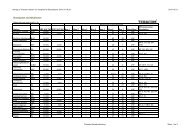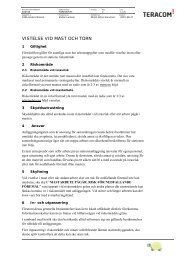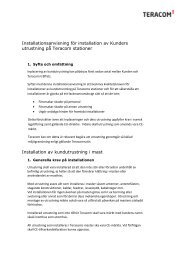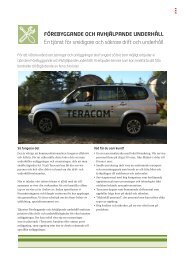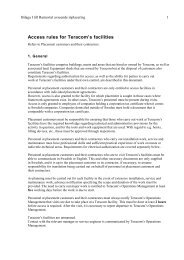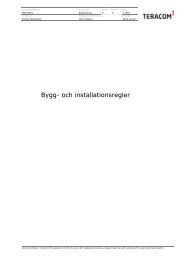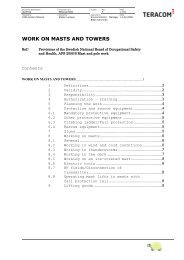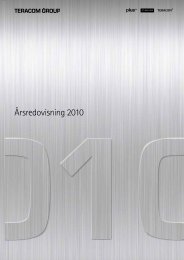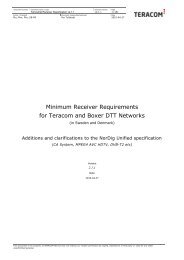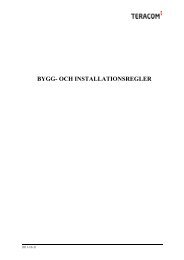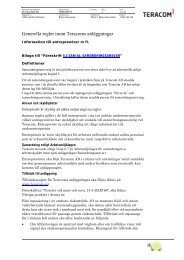Annual and Sustainability Report 2011 - Teracom
Annual and Sustainability Report 2011 - Teracom
Annual and Sustainability Report 2011 - Teracom
Create successful ePaper yourself
Turn your PDF publications into a flip-book with our unique Google optimized e-Paper software.
were examined: revenue processes <strong>and</strong> salary processes. One<br />
aspect of the critical processes related to the financial statements<br />
is to conduct risk assessment in order to make sure that<br />
controls are in place that provide reasonable assurance on the<br />
accuracy of the company's financial reporting.<br />
Control activities<br />
Control activities exist within each area where management<br />
has assessed that there is the greatest risk of a significant<br />
impact on the financial statements. Among other things,<br />
these activities include reporting on deviations, attestation<br />
controls, follow-up on budgets, review of authorizations <strong>and</strong><br />
authorities, <strong>and</strong> follow-up on investments. They also include<br />
several key controls related to the reporting process, which<br />
are performed by the person in the organization who has<br />
been allocated responsibility for that task. The effectiveness<br />
<strong>and</strong> design of controls are periodically reviewed <strong>and</strong> tested.<br />
The Group management team also relies on the information<br />
in employee surveys regarding opportunities for improvement<br />
that exist throughout the organization.<br />
Information <strong>and</strong> communication<br />
The purpose of the Group's information activities is to regularly<br />
provide employees, as well as external stakeholders,<br />
with true <strong>and</strong> fair information about the Group. The external<br />
information should be factual, accessible, honest <strong>and</strong><br />
relevant. According to the Government Ownership Policy,<br />
external reporting for state-owned companies should be<br />
just as transparent as it is for companies listed on the stock<br />
exchange. Therefore, external reporting should, where applicable,<br />
follow the recommendations set out in Nasdaq OMX<br />
Stockholm's regulations. <strong>Annual</strong> reports <strong>and</strong> interim reports<br />
are published at www.teracomgroup.se. Internal information<br />
is primarily communicated via the company's Intranet <strong>and</strong><br />
managers. Policies, guidelines <strong>and</strong> instructions are available<br />
to all employees via the company's intranet <strong>and</strong> commonly<br />
accessible disks. The Group's information <strong>and</strong> communication<br />
channels for financial reporting purposes are deemed<br />
to be appropriate <strong>and</strong> well-known. As such, reporting <strong>and</strong><br />
feedback from the business to the Board of Directors <strong>and</strong><br />
management team is thus possible. Financial information is<br />
collected in conjunction with the month-end closing. Those<br />
persons in charge of subsidiaries <strong>and</strong> Group functions are<br />
responsible for commenting on such information as well<br />
as any follow-up. This is compiled in a monthly report that<br />
describes the Group's development. These reports are distributed<br />
to the Board of Directors, the Group management team<br />
<strong>and</strong> the management teams of each subsidiary.<br />
Follow-up<br />
In this phase of control activities, it is possible to assure<br />
the quality of financial reporting <strong>and</strong> identify any potential<br />
deficiencies. The company's controller function is responsible<br />
for monitoring the business <strong>and</strong> reporting to the Group<br />
management team. The Group management team <strong>and</strong> Board<br />
of Directors are assisted by the audit committee <strong>and</strong> the<br />
company's auditors, which regularly examine <strong>and</strong> test how<br />
risk management, controls <strong>and</strong> the management systems are<br />
functioning within the organization. They also help to ensure<br />
that the internal controls that are in place are working as<br />
intended to achieve the stated goals.<br />
Governance for increased profitability <strong>and</strong> a sustainable<br />
society<br />
Focus on responsibility <strong>and</strong> business orientation<br />
The catchwords for the government's administration of<br />
wholly owned companies are openness, active ownership <strong>and</strong><br />
orderliness.<br />
The owner expects its fully owned <strong>and</strong> administered<br />
companies to serve as role models in sustainability issues.<br />
Since 2008, the Group has improved by working on sustainability<br />
issues in a more structured way. This has been a<br />
learning process, where the Group has collected the experiences<br />
of its companies <strong>and</strong> is always striving to improve<br />
<strong>and</strong> renew itself. The <strong>Teracom</strong> Group reports its sustainability<br />
work in accordance with the GRI guidelines at the C+ level.<br />
Policies <strong>and</strong> guidelines<br />
In order to define the Group's fundamental values, a decision<br />
was made in 2010 to update <strong>and</strong> develop new Group-wide<br />
policies, which were adopted by the Board in December <strong>2011</strong>:<br />
• Ethics policy<br />
• Information <strong>and</strong> Public Affairs policy<br />
• Investment policy<br />
• Finance policy<br />
• Security policy<br />
• Remuneration policy<br />
In addition, there are also the following Group policies:<br />
• Diversity policy<br />
• Environmental policy<br />
• Information security policy<br />
The policies provide the foundation for sustainability<br />
work <strong>and</strong> were developed in stages. The ability to underst<strong>and</strong><br />
<strong>and</strong> live up to these policies on a daily basis is what provides<br />
real value when conducting business <strong>and</strong> to the Group's<br />
stakeholders. For this reason, it is important to find ways<br />
of implementing the policies that reach all employees. To a<br />
limited extent, companies belonging to the Group supplement<br />
these with company-specific policies, such as quality,<br />
work environment <strong>and</strong> network security policies.<br />
Ethics policy<br />
The Ethics policy takes precedence over other policies <strong>and</strong><br />
governance documents in the Group. It aims to provide<br />
support <strong>and</strong> guidance to managers <strong>and</strong> employees. The<br />
policy is based on the OECD Guidelines for Multinational<br />
Companies <strong>and</strong> the ten principles in the UN Global Compact,<br />
such as human rights, the environment, diversity, labor law<br />
<strong>and</strong> anti-corruption.<br />
The purpose of the policy is to ensure that all of the<br />
Group's companies <strong>and</strong> employees behave in a manner that<br />
strengthens the organization's profitability while simultane-<br />
54



